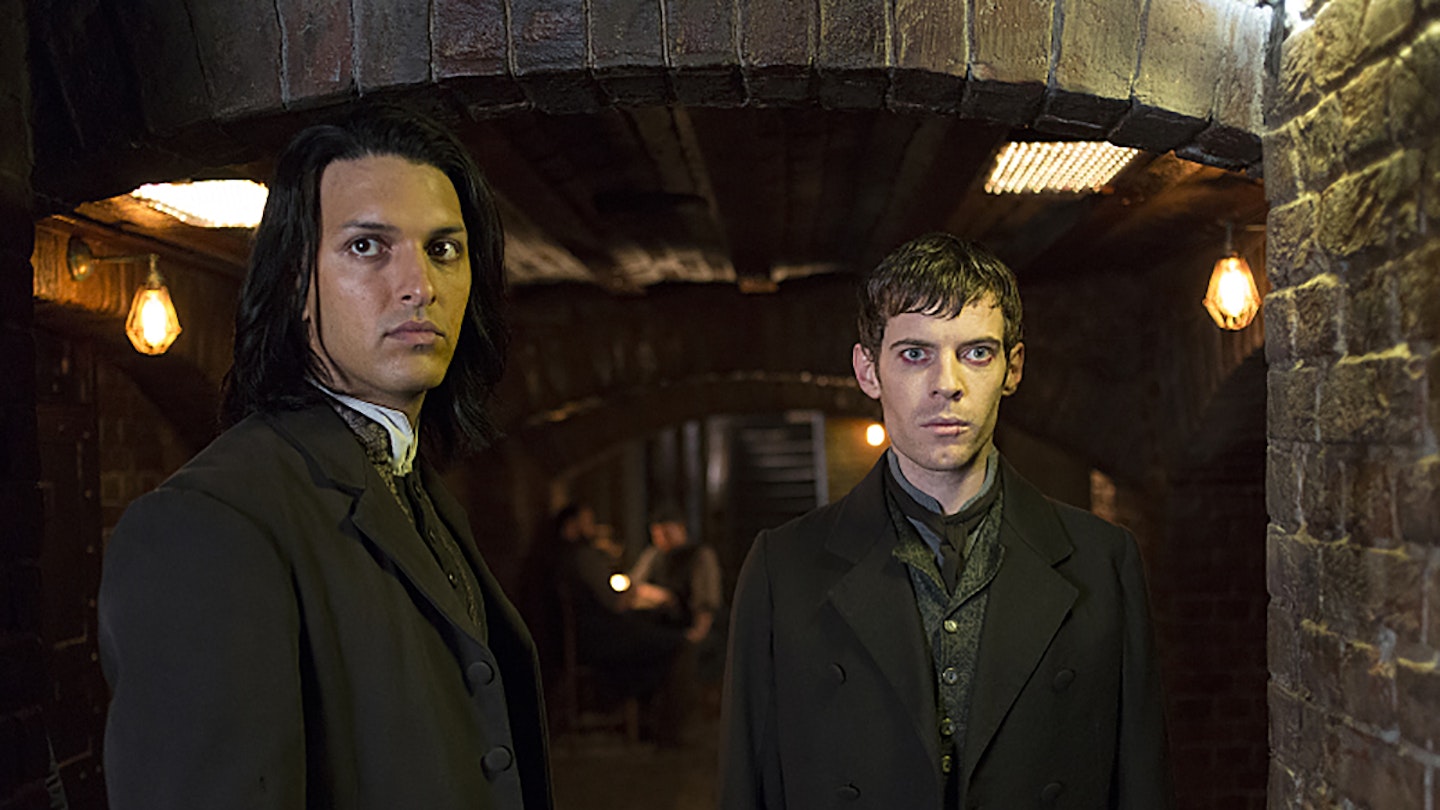There’s something amusing about watching Universal bend over backwards to create an Avengers-like gathering of their classic horror monsters, when in fact the studio had beaten Marvel to the punch decades earlier with such efforts as House Of Dracula, House Of Frankenstein and even Abbott & Costello Meet Frankenstein. The irony is that writer/producer John Logan has already achieved this with Penny Dreadful, the series that brings all manner of creatures and mad scientists together in a growing tapestry of storytelling set in the Victorian era.
On the show, currently in its third season, two of the classic characters are Dr. Victor Frankenstein and Dr. Henry Jekyll. The former, played by Henry Treadaway, is the creator of life from death, who has witnessed failure after failure arising from each success. There was the first “child,” John Clare/The Creature, who, in a fit of rage, destroyed his younger reanimated sibling, Proteus. And finally there was “Lilly,” the former prostitute brought back from the dead to serve as the Creature’s bride, but who, instead, found herself the subject of Victor’s love… before she ran off with the immortal Dorian Gray, the two of them determined to build an army of ever-lasting followers. In simpler terms, things have not gone particularly well for Victor. Some semblance of hope comes from Shazad Latif’s Jekyll, who, not surprisingly, is dealing with rage issues of his own that promise to eventually unleash his inner Hyde. The two of them — longtime acquaintances — begin working together to help each other — which in turn leads to a new kind of personal hell.
Empire caught up with both actors and engaged them in a look at the series and their roles in it.
The Appeal Of Penny Dreadful
Harry Treadaway: I first met with the casting director and then auditioned for John Logan. I hadn’t read the full scripts, just the scenes I was auditioning with, but it was telling from the beginning that this was really good writing. Obviously my education on John Logan is far deeper now than it was before I met him and started the process, but from the start this was a writer who loved language, deep human themes and interesting dark and light characters. Then when I found out what the whole thing was about, it sort of built momentum with excitement in terms of the storylines and the creative melting pot of how he brought all of these characters together. And then there is very much the other actors that are involved. I constantly feel very proud and lucky to be working with them.
Shazad Latif: I’d heard of the show and seen the billboards, but hadn’t watched. When I got the job, I basically watched series one and two in about two days. What drew me in was John Logan’s writing, the music, the production values...everything about it was just so high quality. And then you’ve got the mix of great actors from Britain and America. This was not something I could say no to.
The Victorian Setting
Treadaway: I think the Victorian Age was such a fascinating moment for humans over the last 200 years, because of the industrial revolution and the scientific revolution going on. The sort of inventions that were coming up and our understanding of the human body and religion was very strong still, but there were mixtures of it. Certainly it's a continually rich era to look at humanity from.
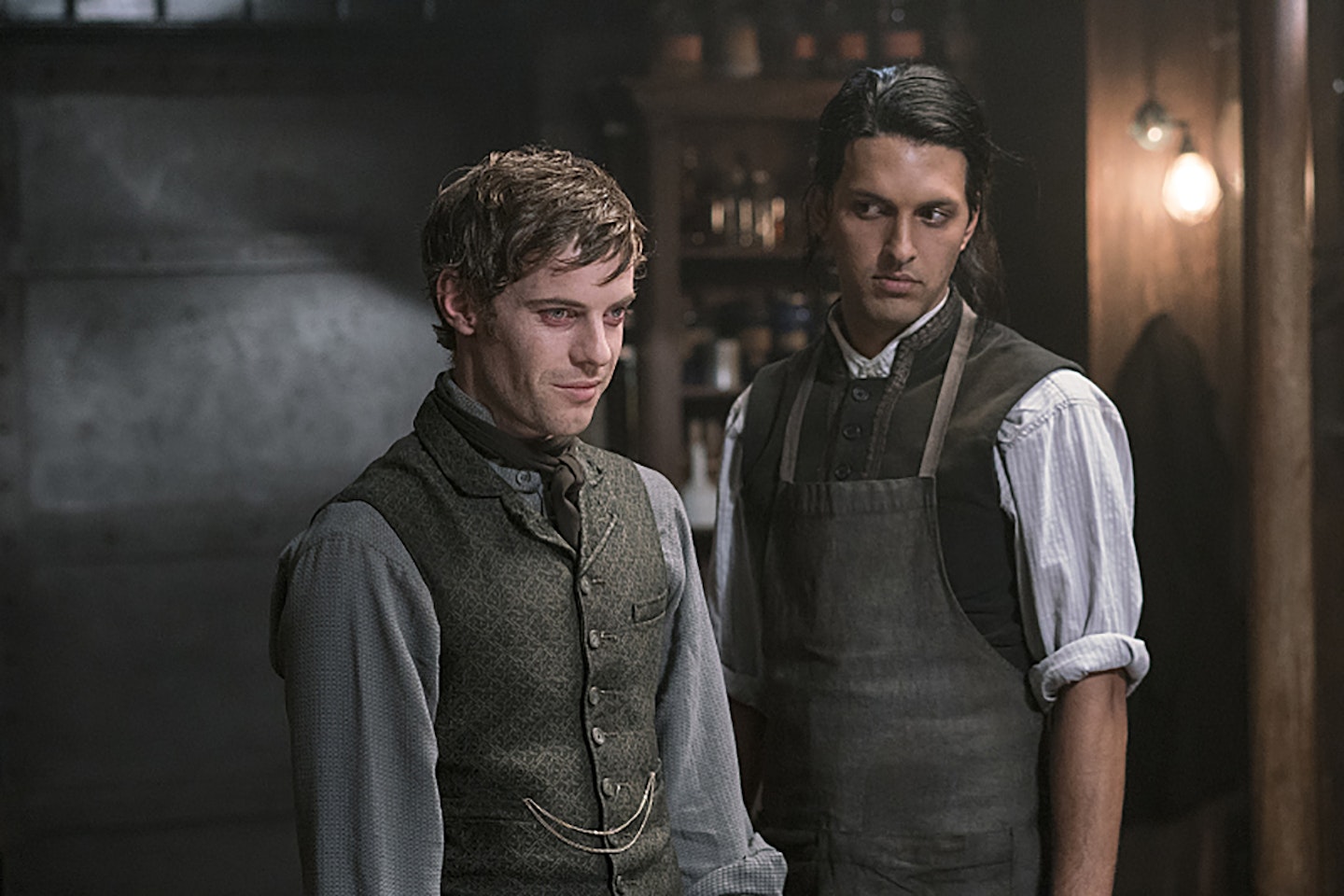
Latif: I wouldn't say I was a diehard fan before, but after reading the Robert Louis Stevenson novel it just felt very modern. You read and you expect, "Oh, it's going to be just a boring old book," but it's not. It's a classic for a reason and the Victorian Age is very interesting. There's a lot of stuff going on in there. It's a very repressed society, but at the same time there's this exploration of the occult...just a very interesting time.
Treadaway: The other thing that's been fun for me is learning about all the medical stuff and the experiments they used to do, and their ethical guidelines...or lack of them. It was very useful for me to interview some experts on the matter that came from University before I started playing Frankenstein. One was an expert on Victorian medicine and one was an expert on medical ethics. It grounded things in a way more plausibly than I'd ever hoped to before I started shooting. They were doing experiments on galvanism at the time where they were putting silver diodes on cadavers' arms and making them move, and making a dead man sit up right through electricity, which is another groundbreaking technology of the time. So they thought for a while of electricity being beyond a light source. They were able to experiment on people who were "mad." They were able to do whatever they wanted with animals, obviously. Looking back, you'd think in that kind of time frame a mad punk genius doctor could just about get away with trying to do what he tries to do. When you look at nowadays where we can transfer arms onto people, we can do heart transplants, lung transplants, most other internal organ transplants...now we've done face transplants. We can grow humans in other humans that don't belong to that human. There's all sorts of incredible medical advances, but what's interesting is that you can see how some of what Frankenstein is getting at is actually becoming more and more plausible.
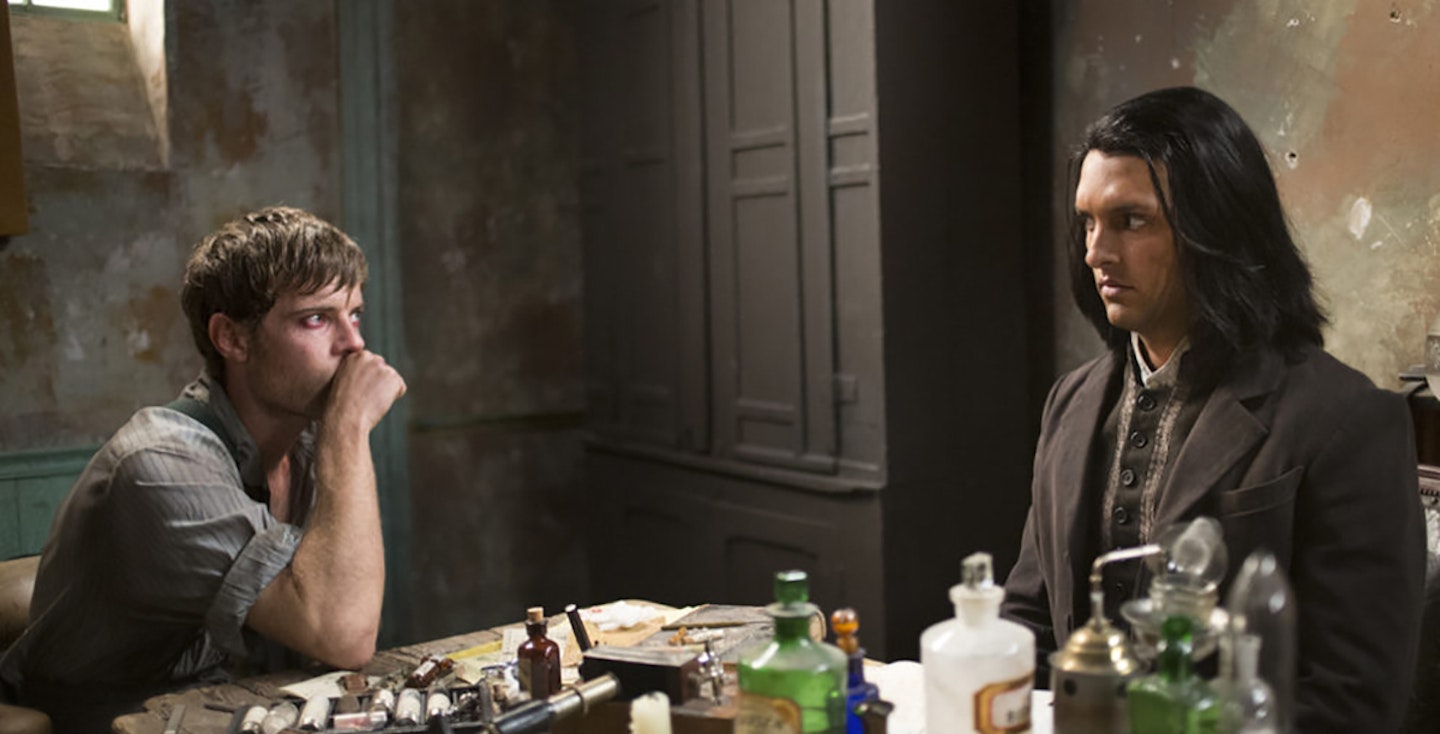
Defining Their Characters
Latif: I’d read the Stevenson book and watched a couple of old versions — the Spencer Tracy version and a Frederic March German expressionist version, but then, obviously, John Logan’s take on it was so different. So you sort of just had to go away from that. He created this whole new back story for Henry Jekyll, which was that his father was a Colonial Raj kind of military guy and his mother was a mistress. It’s just a new take, which meant I had to come in from his angle rather than the classic one, really. Jekyll is just one of the first guys to explore good and evil. In our version he’s already very angry; he’s got a lot of problems with anger. He’s an outcast in Victorian England, and we play on that a lot. So he finds a friend in Frankenstein, the two of them a pair of loners and outsiders.
Treadaway: Victor is obsessive. Driven. He has brought people back from death, so he’s either a magician, godlike, the best doctor in the world or he’s a shaman. He’s something. He’s doing something that no one else has ever done before or since. But with that comes a massively difficult psychological impact, because he can’t share that information with anyone — though he does eventually share with Henry Jekyll. And his first-born has gone off, his second born has been killed by his first-born. He’s trying to recreate life, but he realizes there are many more facets to it than just that. He has fear and guilt and paranoia. Also, a healthy morphine addiction on top of that. So he’s rather brilliant, but troubled. He achieved remarkable things, yet is a lone wolf at the forefront of Victorian medicine.
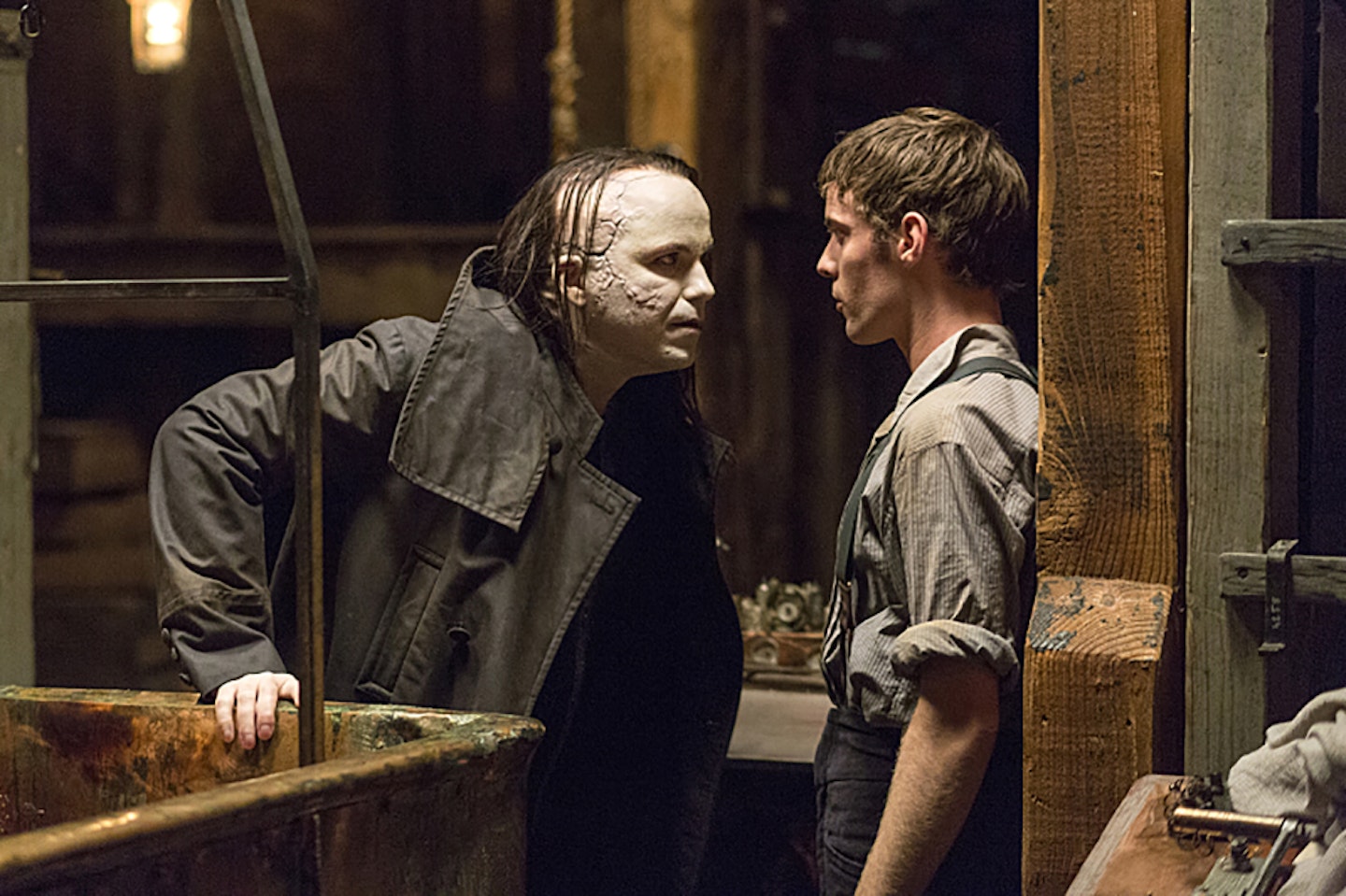
Latif: As this year unfolds, there’s definitely hints of Mr. Hyde in Jekyll. You see that the anger is sort of the main thing; that there’s something inside of him already that is obviously going to grow and that he’s trying to control; to tame the beast within, as he says in the first episode.
Treadaway: What happens if everything you ask for comes true? If you create what you think you want, eventually is it something you really want? And of course if you create something that’s autonomous, then you have to face the consequences of that. You create something which is profound and incredible, but sometimes that kid can become a mass murderer. What happens then? What happens to your love for that kid? Do you still love them and are you still proud of them? Or would you do anything to stop them from doing what they’re doing? Would you kill to stop them? That, for me, is the drama of season three. It’s like someone who created the atomic bomb and was just a really great scientist who knew nuclear fission. Then it gets turned into a mass bomb. So that’s where he is, I think. He’s trying to change what he saw when his mother died by attempting to create life. That is his goal. But by doing that, he’s realized that if you actually create life, then it becomes feelings and heart and love and soul and personal free will.
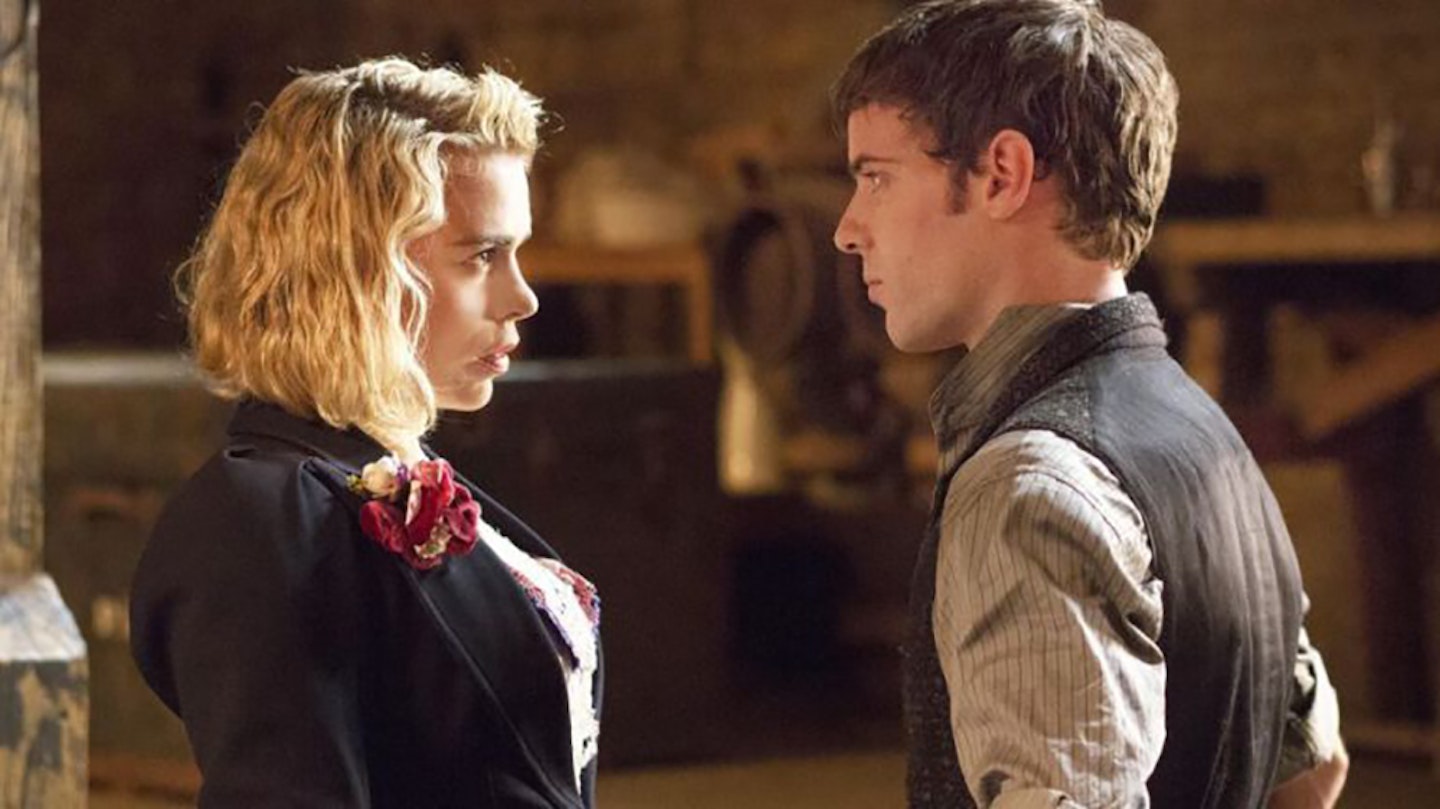
Latif: A lot of season three for me is mainly just Harry and I in a lab doing weird things, which sounds odd I suppose [laughs]. There was a lot to work with. Great monologues and duologues — two intense guys in a room. With Frankenstein and Dr. Jekyll, there’s a lot of history with them and a competitiveness that we play on. It’s just them doing science together, but obviously in a very intense way. There’s a lot of depth. That’s something I would say about the show — everything’s based on the characters and their emotional journeys rather than super powers or taking things a bit too far.
Treadaway: Frankenstein is dealing with the repercussions of his experiment getting incredibly worse and he doesn’t know how to handle the whole shebang. He’s someone who orchestrates such control in his laboratory. He’s not ready to deal with the repercussions of it going wrong, so he’s not in very good stead. What he needs is a friend… Enter Dr. Jekyll.
Penny Dreadful airs on Showtime in the US and Sky Atlantic and Now TV in the UK.
